This article covers the experience of a mid (ok, late) thirties runner and dad who decided to take triathlon training seriously, and hired a coach. In it are discussed the process of finding a coach, developing and working through a training plan, setting goals, and ultimately racing. If you are considering hiring a coach, it may help you determine if getting a triathlon coach is right for you.
Some Background on Why I Got a Tri Coach
Nearly 15 years ago I ran my first triathlon, with guidance from a supportive family member that was big into them at the time. The experience was great and led to a few additional races over the following years. As life caught up, the hobby fell by the wayside and my focus shifted mostly to running.
Then in 2021 the re-opening of local events and a desire to do something new led to signing up for a local Olympic distance race, which was repeated in 2022. This meant there was a 7 year gap from my last triathlon.
Again things went well, it was an enjoyable two days and my focus on running led to an over indexing against the field in the run. Although I “raced” this event both times it was without a clear time target and instead a goal to have a supported hard workout for the day.
As 2023 rolled around and the chance to signup for the race the third time approached, I made the decision to really try to improve. This led me on the search for a triathlon coach for the first time. I knew that there was both technique and structure to the running and swimming that could make huge gains.
My previous attempts at a triathlon were on entry level touring bikes, not road or tri bikes, which landed me in the bottom 20% of finishers on the bike. This meant that the biggest improvement a coach could provide was some structure around how to approach improving the bike (which is often the case since it is the longest discipline in nearly all distances of triathlon).
What Did I Expect from a Triathlon Coach?
Before starting the search for a coach, I had to have a realistic expectation of what I was looking for. For the past 15 years I considered myself to be self-coached through a handful of Spring and Olympic distance triathlons, a dozen half-marathons, two marathons, an ultra-marathon (50k), and a few dozen local 5ks or other various events.
For at least two of those (the marathon and one of the 5Ks) I even managed to follow at least 80% of an actual structured training program. Even when not training, workouts stacked up over time as running was always a bit of mental therapy in addition to being a physical pursuit. Getting a formal coach though was a way of building accountability toward a plan and signaling a level of maturity and seriousness that had, to that point, not been applied to any of those trainings.
A short list of documented expectations from a coach that I wrote out prior to searching for and signing up to any program:
- Accountability to a structured training plan that could be calibrated to my personal abilities and worked into my schedule
- Access to a network of other athletes for potential sharing of tips
- Direction on bike fitting, bike positioning, and a focus on bike improvements
- Regular chat feedback on why a workout was in the plan, and what to do if it had to be skipped
- Unbiased feedback on how I was preforming, with a focus on the ability to tell me any “bad” news or things I did not want to hear
- A reasonable fee and ability to signup for a 3-4 month lead up to my initial target race
- Specific experience with Olympic distance races and longer ones
- Virtual communication as a first priority, with an ability to meet in person (preferring local coaches)
After some review and starting with a coach, the two bolded items were the keys where I quickly saw some value. It is easy enough to find a plan and additional information, but having a coach helped turn a rigid plan into a dynamic training block while keeping other variables (schedules, injuries, recovery, strength, life) that impacted the plan in perspective.
The other thing a coach did, with the structured plan, was help me to focus on the areas where I could improve. This was in contrast to my past efforts where I would spend most of my time training in the area I liked the most. So while my run would get better I was losing the opportunity to drop more time by focusing on my bike leg.
Finding and Hiring a Triathlon Coach
Once I decided to get a coach the next question was how to find one. There are a few options here but it really depends on what you are looking for. Beyond the above requirements I also wanted to ensure my coach had some credibility. There are a few major places where coaches can gain certifications for triathlon training, notably the USA Triathlon group has a certifications program.
To be listed on the USA Tri search for coaches though a coach must have an active certification, something that is renewed annually. For many coaches that maintain on-going clubs, have passed the certification at some point, staying current is a bit of a drain. The cost is minimal but it is unlikely that the search features really leads to a lot of clients beyond what an active club and business could generate with more local marketing.
Training Peaks, the training management software that we have reviewed before, also offers coaching certifications. They have their own Training Peaks coach search feature that can be used to find coaches, so long as they are still current. For the most part Training Peaks certification shows that a coach knows how to navigate the software although it does include at least some limited digital instruction on how to manage training plans.
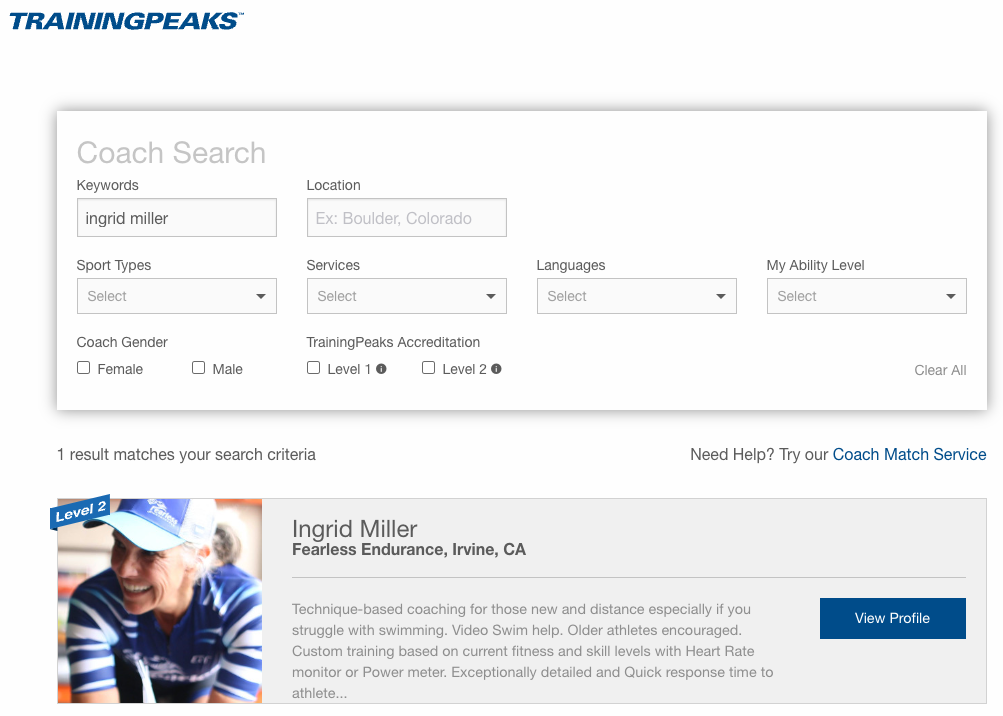
At the end of the day, personal referrals also work. It turns out that a friend had just completed a half-ironman 70.3 distance race under the guidance of a coach. At his recommendation we reached out, and although she was on some of the search features, they ultimately were no better than googling Triathlon Coaches near me.
Training for a Triathlon on a Busy Schedule
One of the first things to note about the new training schedule was the overall time it was expected to consume. After an initial ramp up the weekly schedule quickly ramped to 7-8 hours of workouts per week. Add in short travel time to a pool, prep time for rides, and shower time after and this easily gets to be 10 hours needed per week.
With a family of four, with two little ones in school and athletics themselves, working full time, volunteer coaching for youth sports, and having a handful of additional hobbies and social events, tacking on this amount of workouts meant finding time is serious. Thankfully not all of this was incremental time, even in a typical week there are 3-4 hours of workouts already, albeit in a more unstructured way.
This commitment of time was to be expected though. Part of the initial intake with my coach was sharing what time I was able to dedicate. For me I choose a simple 1 hour per day, each day, knowing that some days would likely require more. It’s hard to prepare for a 2-3 hour race without ever doing a workout over 1 hour.
Is Having A Triathlon Coach Worth It?
A dedicated coach is not free, but coaches do vary in price. Well there is a chance that you get what you pay for, since people are looking for different things out of a coach it is hard to describe how much they are worth. If you are already spending hundreds (or thousands) on gear and race entry, then a coach to help prepare accordingly will ensure you get the most out of the rest of your spend. Our experience was that a coach had benefits in swimming efficiency, bike power output, comfort running off the bike, and overall weight loss and recovery which made it well wroth the $120/month.
Why bothering getting a super aero tri bike, then failing to ride it efficiently. Spend 10-15 hours a week training when you could get the same results from 7-10 hours plus proper rest and you will quickly find the benefits of a coach.
Six weeks into the Training plan and the ability to stick to a training plan has been enhanced by having some external accountability. It is also clear that there are some tougher to accept truths around training that are easy to understand when delivered by an unbiased third party (ie. You’re not as fast as you think, so you’re going to hard, to often!).
14 Weeks into the Training plan and things are progressing well. With a focus on improving my bike split I was able to increase my FTP by 8% (21 watts) and when accounting for weight loss my bike power improved by ~18% or 0.5 W/kg. What’s even better is that those increases compare a dedicated 20 min FTP trail with a hard 20 interval done during a normal interval workout, so there may be more benefit available.
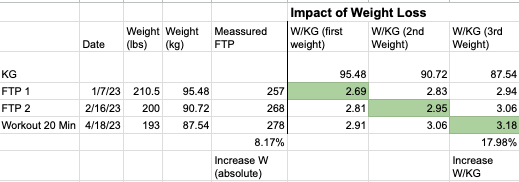
Running pace improved, as did running efficiency. As for the running improvements they have not been as drastic as back when I did a dedicated 5k training plan. Instead running was less of a focus although there was still a great improvement thanks to the weight loss as well as overall cardio cross-over benefit from the bike.
Shorter intervals on the run did make it easier to run at a decent effort and my time trial mile from the beginning of training wound up being slower than many mid-workout intervals during my workouts. What also helped a lot were a number of short brick runs. These 10 minute sessions running off the bike, coupled with a switch to a triathlon bike have made it much easier to fall into a rhythm even when the b
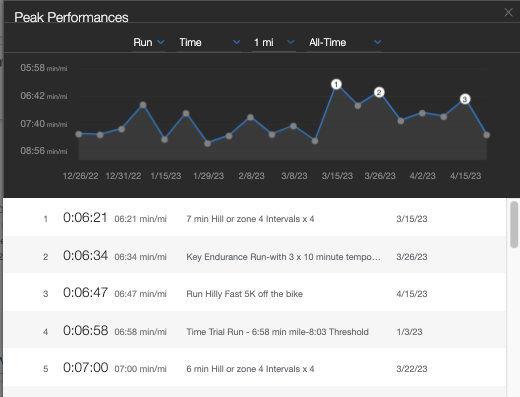
Beyond just running and biking, having a coach helped provide external motivation to support intrinsic motivation to get in shape. It also made it easier to stick to a 16 week training plan, and more importantly get back to the plan even when one week was thrown off.
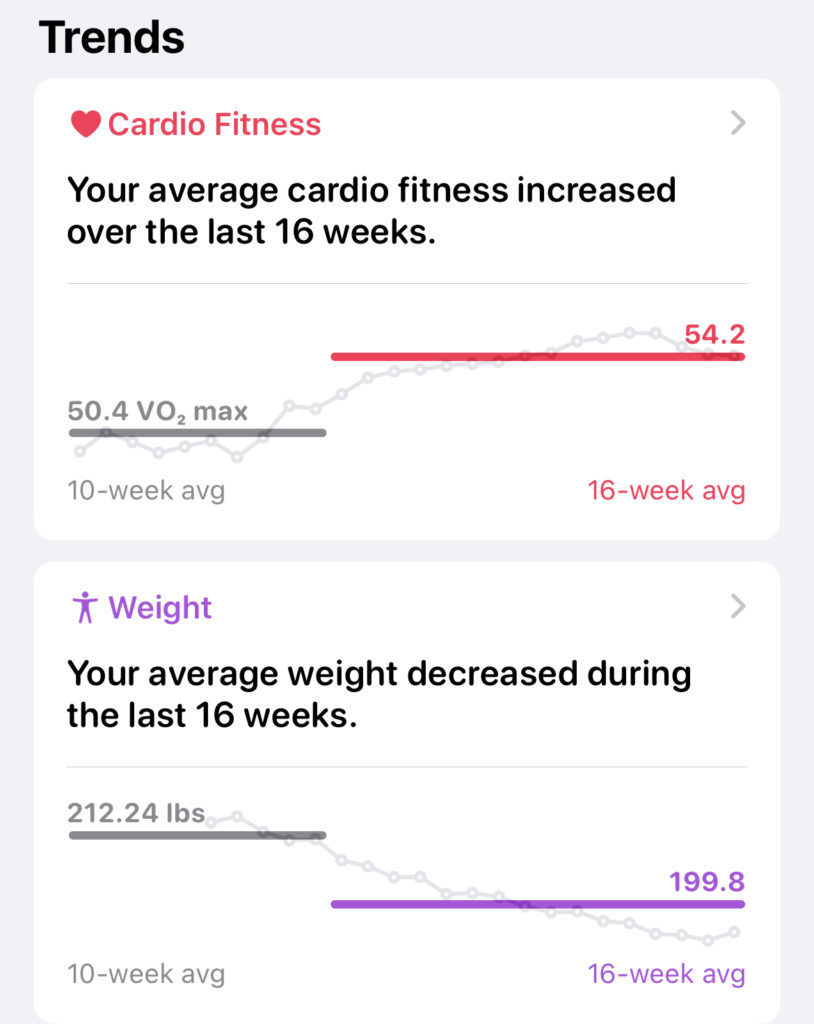
Overall the coaching led to benefits in tracked Cardio Fitness (a measure of VO2 max, a statistic we’ve covered extensively), and significant weight loss thanks to the increase in total active calories. Of course the weight loss had impact on the FTP calculation, as well as swimming and running performance. But most importantly it helped with general day to day and recovery.
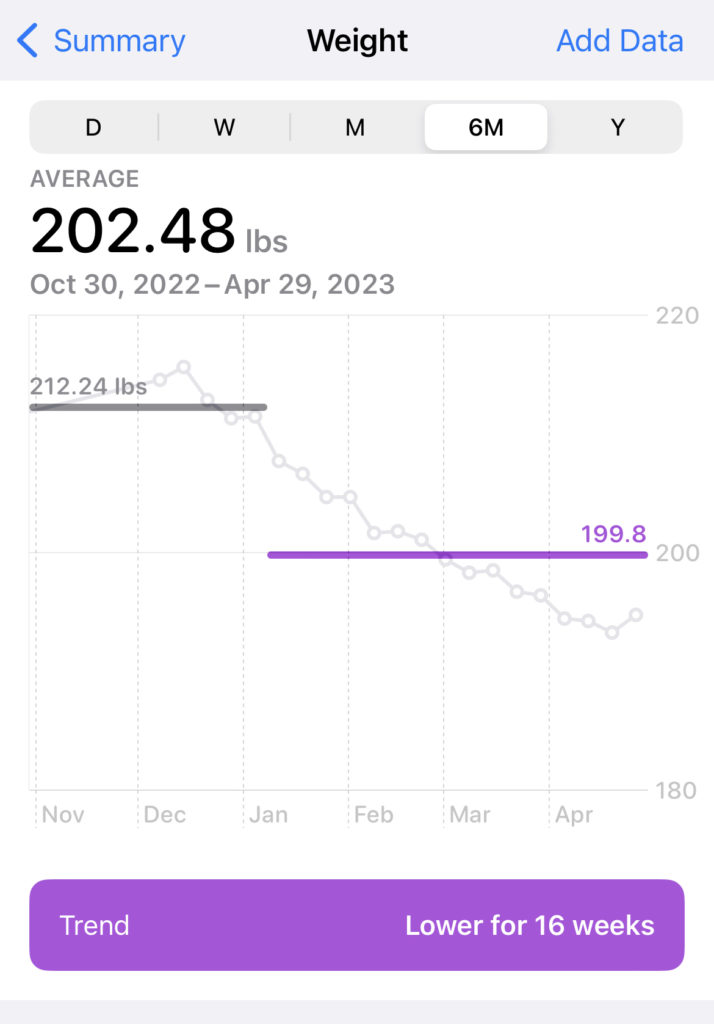
Being nearly 20 pounds lighter meant that recovery runs put a lot less stress on joints. Losing that much weight did make it hard to shop for a wetsuit, but hitting milestones made it nice to reward myself with some new kit. While a coach is not intended to help with weight loss, it did provide an independent party to celebrate with and someone to provide support and encouragement along the way as well as tips on when to ensure proper nutrition to get maximum training benefits.
We’ll update here as the plan progresses. It is still a week until the A race, the local Mission Viejo Olympic Distance Triathlon, but so far the benefits of having a coach greatly out weigh the cost.
5 thoughts on “I Hired A Triathlon Coach – Here’s How It Went”
Comments are closed.